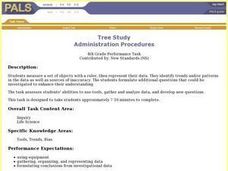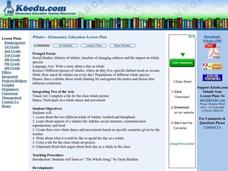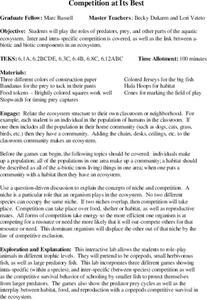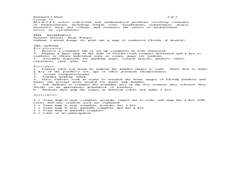Curated OER
Investigating Animals in Water
Students observe small animal activity. They identify local water animals and describe the habitats where water animals can be found. Students collect samples to observe in the classroom.
Curated OER
What's That? Diversity Among Organisms
Seventh graders can go outside and explore the organisms that live in the environment outside their door. This is a wonderful opportunity for students to examine the world around them with a new perspective. This activity will increase...
Curated OER
Tree Study
Students measure the lengths of provided leafs to the nearest millimeter. Students identify trends in the data as well as sourced of inaccuracy and formulate additional questions that could be investigated to enhance their understanding.
Curated OER
Insects and Spiders
Students make either and insect or a spider using materials their teacher provides. They then draw of picture of their organism and defend why it is either a spider or an insect.
Curated OER
Rollin' On The River II
Students explore the importance of the Platte River to the state of Nebraska. They investigate the river's historical, social, economic, and political importance to the development of Nebraska. Students explore the ecosystem of the river.
Curated OER
Whales
Students study the history of whales. In this whale lesson plan, students research two types of whales, color a tile, and write a one page paper. The tiles may be combined to make a group picture.
Curated OER
Animals Piece by Piece
Students sort organisms and objects into groups according to their parts and describe how the groups are formed.They identify body parts of animals from puzzle pieces, assemble the puzzle, and name the animal.
Curated OER
Sexy Coral Reef and I Want My Own Space
Fifth graders explore how coral polyps increase the chances of egg and sperm meeting after being released into the vast ocean waters.
Curated OER
Hickory Dickory Dock: The Biological Clock
Learners investigate the effect of day length on animal migrations. They view a Powerpoint presentation, identify their own personal migrations and cues, answer discussion questions, and test a hypothesis about seasons.
Curated OER
Compettion at its Best
Sixth graders role play predators, prey and other parts of the aquatic ecosystem. They show inter and intra-specific competition as well as the link between abiotic and biotic components in an ecosystem. Students play games about the...
Curated OER
DID YOU HELP CREATE THIS
Students examine whether their actions are positively or negatively affecting organisms and their habitats. They choose an animal to study then create a multimedia presentation including charts and graphs of data logger information and...
Curated OER
Trail Adventure
Students create a trail with numbered specimens. Students complete an accurate and functional interactive trail activity brochure. They complete a web page tree identification guide and interactive identification activity. Students...
Curated OER
Microorganism Multiplication
Seventh graders complete two experiments to learn about harmful and helpful microorganisms. In this microorganisms lesson, 7th graders read background information about fungi, yeast, and club fungi. Students then complete two experiments...
Curated OER
Loggerhead Nest Management Program
Students identify the sea turtle management documentary and complete an activity for each slide. They plot the location of nests laid on the island they patrol and discuss their rationale for management decisions. Finally, students...
Curated OER
Here's Looking at You
Students assess some common inherited traits which are easily observable and note their phenotype for the trait. Students compare their phenotypes to those of their parents and attempt to describe the pattern and manor of inheritance.
Curated OER
Home on the Range
Young scholars use maps and mathematics to determine the appropriate panther population in a given area. In this Florida ecology lesson, students research the area requirements of male and female panther and use a map to help calculate...

















